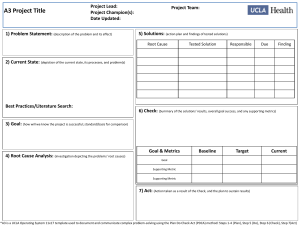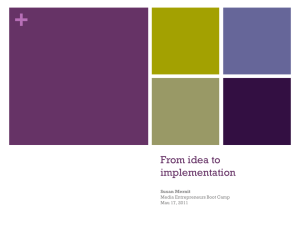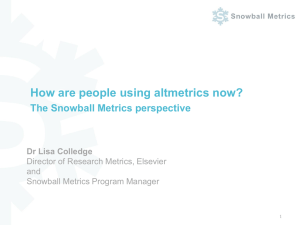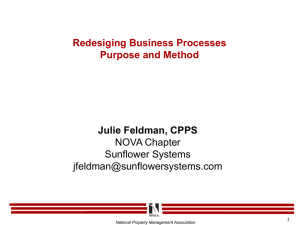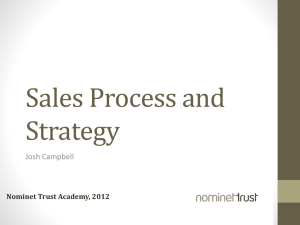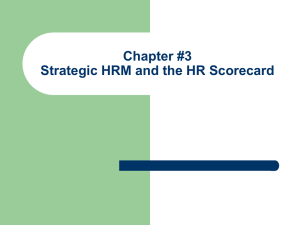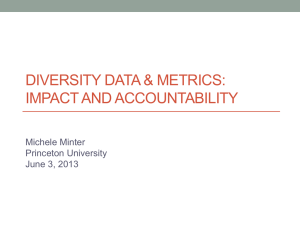TG meetings - Anna Clements-Lisa Colledge (Snowball
advertisement
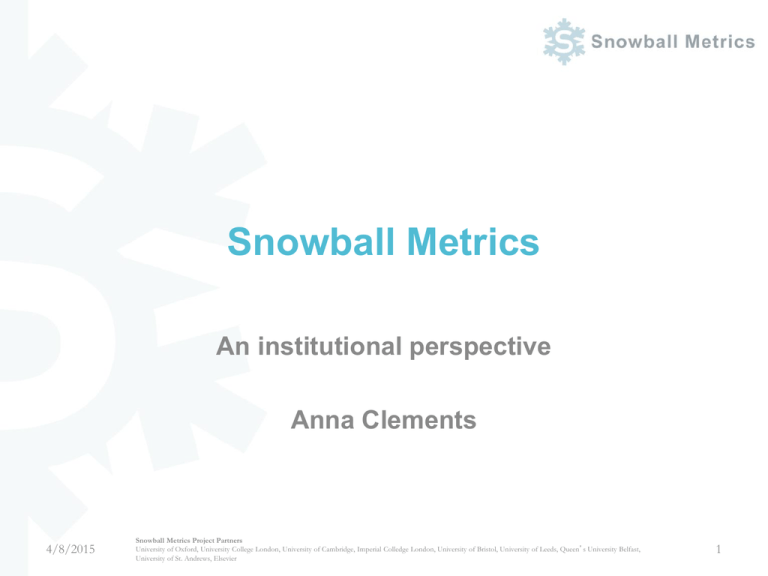
Snowball Metrics An institutional perspective Anna Clements 4/8/2015 Snowball Metrics Project Partners University of Oxford, University College London, University of Cambridge, Imperial Colledge London, University of Bristol, University of Leeds, Queen’s University Belfast, University of St. Andrews, Elsevier 1 The origins of Snowball Metrics Sentiments among English research institutions were the prelude to this partnership •Growing recognition of the value of data/metrics to inform and monitor institutions’ research strategies •Dissatisfaction with available tools: multiple custom implementations, incompatibility of data systems •Frustration over the lack of standard metrics available to give sensible, relevant measurements •Frequent data requests from external bodies put pressure on institutions to collect and return data on aspects of performance that are not necessarily best suited to the institutions themselves Imperial College London and Elsevier conducted a study of research information management in England funded by the Joint Information Systems Committee (JISC) Highlighted recommendations from the study • Institutions and funders should work more collaboratively, and develop stronger relationships with suppliers • An agreed national framework for data and metric standards is needed • Suppliers should participate in the development of data and metric standards ... which led to Snowball Metrics Snowball Metrics Project Partners University of Oxford, University College London, University of Cambridge, Imperial College London, University of Bristol, University of Leeds, Queen’s University Belfast, University of St. Andrews, Elsevier Defining Snowball Metrics A subset of participants initiated a second phase of work that would address and build on these recommendations Project Partners • Vision: Institutions agree on metrics and methodologies as standards to support strategic decision making by enabling benchmarking across institutions globally • Approach: Eight UK higher educations institutions working with a supplier, Elsevier, partnered to reach consensus on a set of metrics. Snowball Metrics reflect universities’ view of the world, not Elsevier’s. Elsevier played a supporting role to help higher education institutions articulate their needs, and to test the feasibility of addressing them • Outcome: Agreed and tested Snowball Metrics methodologies have been shared freely in the Recipe Book, so that any organization can adopt the framework • Next steps: All project partners are committed to facilitating a global definition of these metrics as standards by incorporating other existing standards into the “recipes”, and working with all suppliers to implement these metrics Snowball Metrics Project Partners University of Oxford, University College London, University of Cambridge, Imperial College London, University of Bristol, University of Leeds, Queen’s University Belfast, University of St. Andrews, Elsevier Summarising • Owned by research organisations – not imposed by funders or third parties • Metric definitions ‘recipes’ available to all • Using/building on existing standards – CERIF; HESA cost centres • Minimise burden 4/8/2015 Maximise usefulness Snowball Metrics Project Partners University of Oxford, University College London, University of Cambridge, Imperial Colledge London, University of Bristol, University of Leeds, Queen’s University Belfast, University of St. Andrews, Elsevier *Ordered according to productivity 2011 (data source: Scopus) 4 Snowball Metrics Recipe Book Launch Dr Lisa Colledge Elsevier l.colledge@elsevier.com 4/8/2015 Snowball Metrics Project Partners University of Oxford, University College London, University of Cambridge, Imperial Colledge London, University of Bristol, University of Leeds, Queen’s University Belfast, University of St. Andrews, Elsevier 5 Snowball Metrics Landscape • Metrics are sliced at the institutional and discipline / funder type levels • Metrics need a combination of institutional, proprietary, and public data Snowball Metrics Project Partners University of Oxford, University College London, University of Cambridge, Imperial College London, University of Bristol, University of Leeds, Queen’s University Belfast, University of St. Andrews, Elsevier Global standard metrics need to be “SMART” • • • • • Specific and Scalable Manageable Agreed Realistic across the sector Timebound… 4/8/2015 Snowball Metrics Project Partners University of Oxford, University College London, University of Cambridge, Imperial Colledge London, University of Bristol, University of Leeds, Queen’s University Belfast, University of St. Andrews, Elsevier *Ordered according to productivity 2011 (data source: Scopus) 7 How did we make Snowball Metrics SMART? • Data Experts from the institutions agree theoretical consensus • Elsevier developed a feasibility pilot – Make the calculations with actual data – Allow the project partners to view their metrics over time and gain context around their performance 4/8/2015 Snowball Metrics Project Partners University of Oxford, University College London, University of Cambridge, Imperial Colledge London, University of Bristol, University of Leeds, Queen’s University Belfast, University of St. Andrews, Elsevier *Ordered according to productivity 2011 (data source: Scopus) 8 Towards global standards Share Visibility Accessibility Feedback 4/8/2015 Recipe Book is free of charge • www.snowballmetrics.com Webinar Regional workshops UK Express metrics in CERIF Incorporate in suppliers’ tools Fit of recipes to national ingredients? What would help you to adopt? Snowball Metrics Project Partners University of Oxford, University College London, University of Cambridge, Imperial Colledge London, University of Bristol, University of Leeds, Queen’s University Belfast, University of St. Andrews, Elsevier *Ordered according to productivity 2011 (data source: Scopus) 9 Thank you for your attention! 4/8/2015 Snowball Metrics Project Partners University of Oxford, University College London, University of Cambridge, Imperial Colledge London, University of Bristol, University of Leeds, Queen’s University Belfast, University of St. Andrews, Elsevier *Ordered according to productivity 2011 (data source: Scopus) 10

